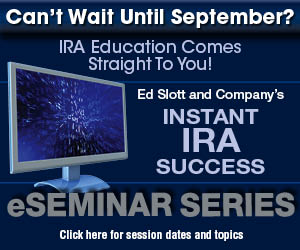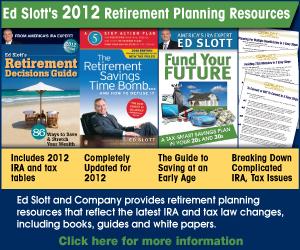This week's Slott Report Mailbag includes questions about converting an employer-based 401(k) to a Roth IRA, the use of trusteed IRAs and what to do if you want to make an IRA contribution from money you earned at the end of 2011, but didn't receive until 2012. As always, we stress the importance of working with a competent, educated financial advisor to keep your retirement nest egg safe and secure. Find one in your area at this link.
1.
Ed and Company,
 |
| Send questions to [email protected] |
Can I convert my IRA or employer plan to a Roth IRA?
All funds in traditional IRAs, SEP IRAs, and employer plans such as 401(k)s are eligible to be converted to a Roth IRA. Funds in a SIMPLE IRA can also be converted AFTER the SIMPLE account has been open for two years. A conversion before that date will be subject to a 25% penalty tax on the amount withdrawn AND the funds are not eligible for transfer to any other type of plan except another SIMPLE. To do a conversion of employer plan funds, you must be eligible to take a distribution from the plan.
Does this mean that I could roll over the funds in my 401(k) account (which is still with my former employer) directly into a Roth IRA instead of a regular rollover IRA without paying any taxes or penalties at the time of the rollover?
Thank you very much in advance for clarifying this for me.
Answer:
If you are eligible to withdraw the funds from your 401(k) plan, then you can convert those funds directly into a Roth IRA. You no longer have to first establish a traditional IRA (under the old rules) with those funds and then convert to a Roth IRA. You can now go directly to a Roth IRA. You will, however, have to pay income tax on the taxable amount being converted.
2.
Ed and Company,
What are the advantages and disadvantages of Trusteed IRAs? Are Trusteed IRAs protected from creditors?
Answer:
There are two possible ways to answer your question. If you are asking about the difference between a self-directed IRA and a managed or trusteed IRA, then both are treated identically for creditor protection purposes. You have whatever protection is available under state law. Then there are trusteed IRAs that are offered by a handful of IRA custodians. They are sort of a poor man’s trust. You may have a series of check boxes where you select the provisions that you want to apply in your case. Again, any creditor protection will be what is available under state law.
3.
I have an issue.
I generated earned income (salary) for the pay period Dec 18 -31. Disbursement of pay for the period didn’t occur until January 2012, consequently, I did not receive a W-2 for 2011.
Can I make an IRA contribution for 2011 in an amount not to exceed the Gross Pay earned during the period Dec 18-31? I was intending to make the contribution and in lieu of a W-2, I would attach the corresponding pay stub received in January which indicates it covers a pay period ending Dec 31, 2011.
Thanks for your help!
TC
Answer:
Interesting question that could perhaps best be answered by your tax preparer. The answer may depend on the date of the check that you received rather than on the actual dates you worked. Nonetheless, we picked this question because many individuals could be in you exact predicament, and the answer is never to guess yourself, but rather to ask your tax preparer.
-By Marvin Rotenberg and Jared Trexler




 Articles That Move
Articles That Move







0 comments:
Post a Comment